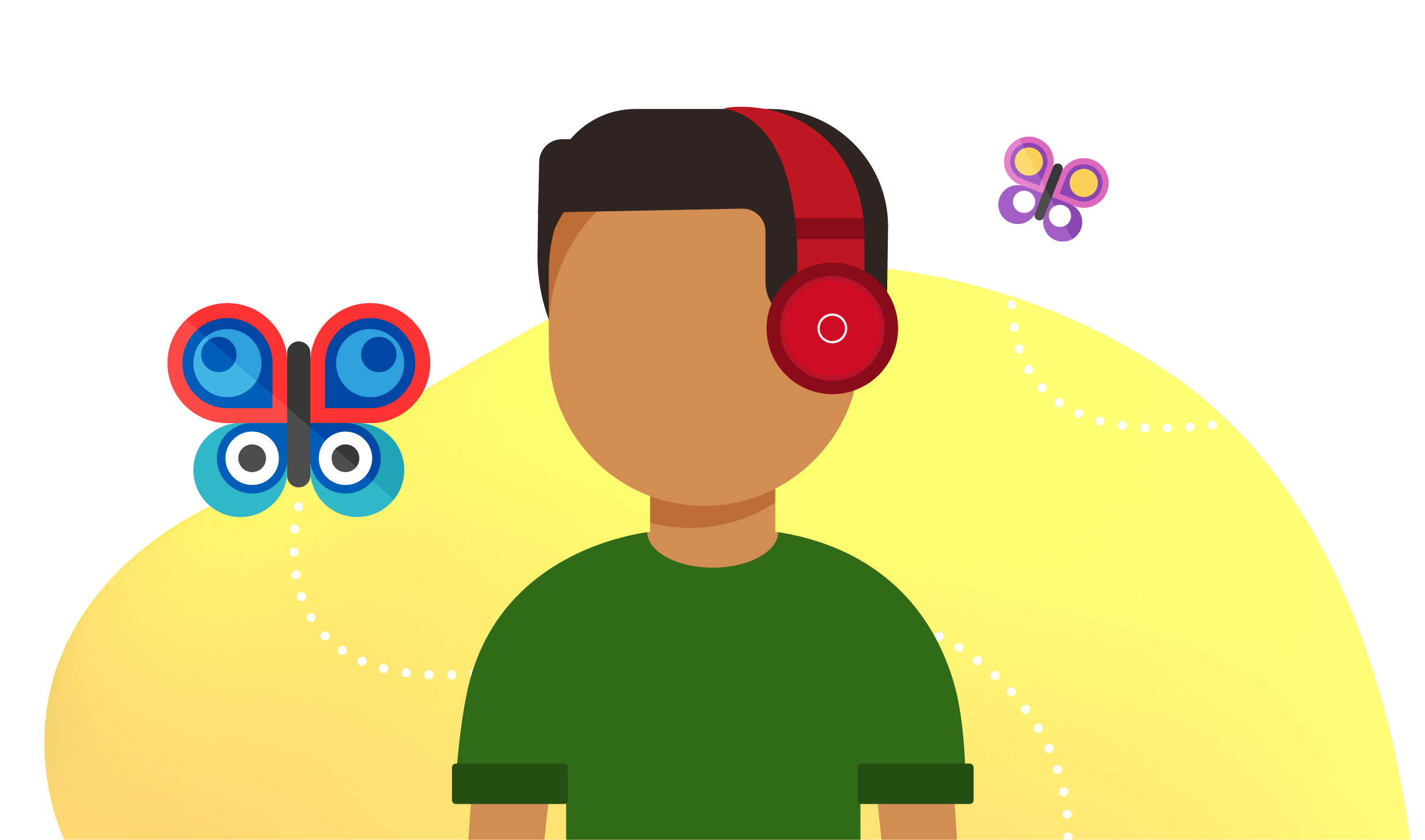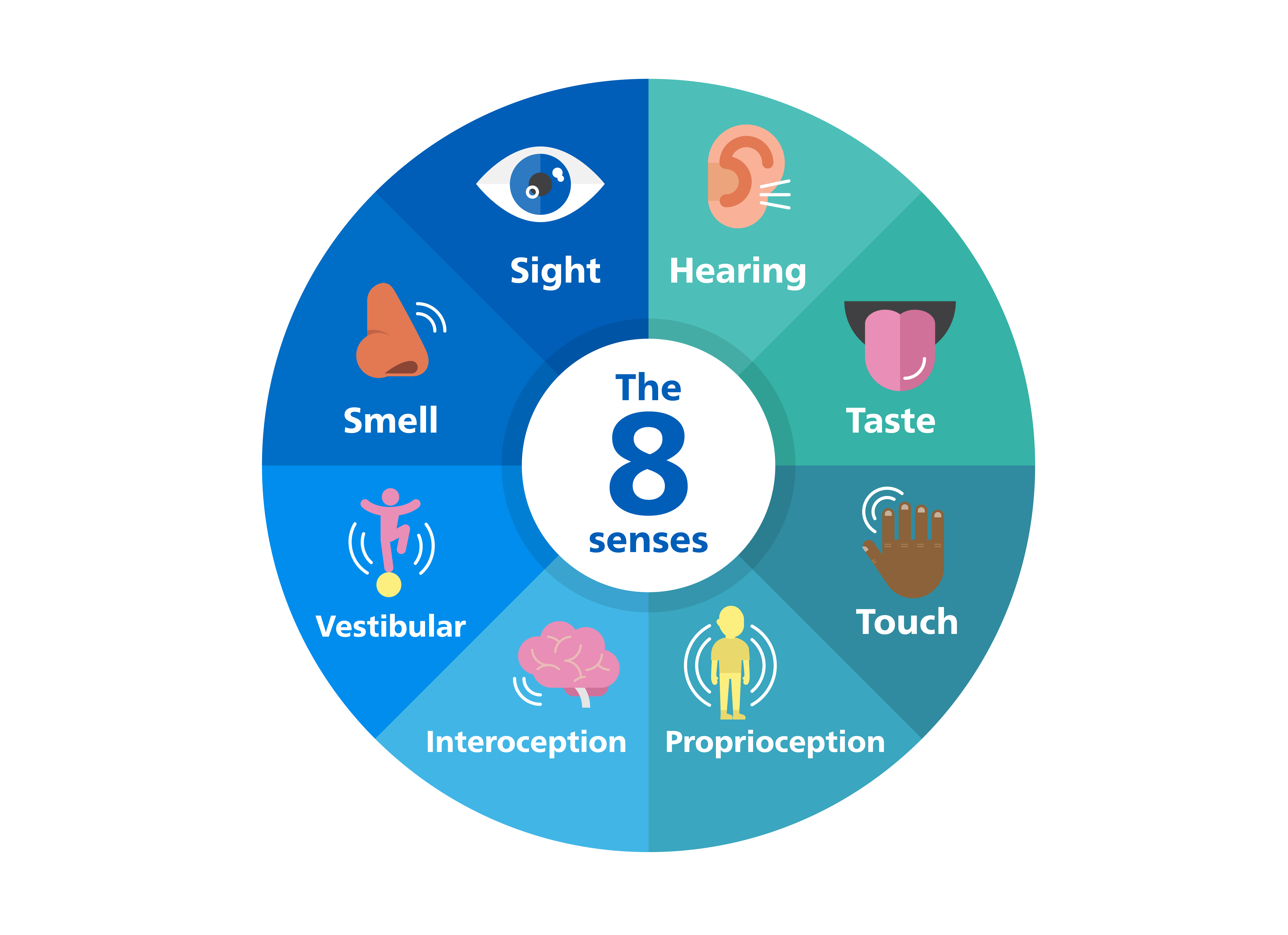Sensory Processing
The way we get information from our different senses, and what our brains do with it, is called sensory processing. We are all individuals and our brains process information slightly differently. This means we have different sensory likes and dislikes. Think about what food and drink you like and don’t like. Some people love coffee; some people don’t. And what about Marmite?!
The sensory system within our bodies processes incoming information all day long and works to keep our system balanced. This is called sensory self-regulation and means we feel comfortable and ready to take part in activities, such as playing, learning, exercise and sleeping.

Our Amazing Eight Senses
We have five traditional senses of sight, smell, hearing, taste and touch. In addition, we have 3 internal senses.

- Proprioception – awareness of pressure and force on your body, and knowing where your body is in space/ its location. Differences with proprioceptive processing mean you might bump into things, or feel the need to chew or bite down on toys or clothing, or you might need to keep moving about even when others around you are sitting still.
- Vestibular – awareness of balance and movement. If you have a high threshold you may need to rock, spin or swing lots more than other people. If you have a low threshold you might avoid swings and movement altogether!
- Interoception – awareness and understanding of what’s going on inside our bodies, such as how we feel hunger, pain, needing the toilet, or whether we are hot and cold. Interoception can also help us with body signals about how we are feeling emotionally. Someone with interoception differences may feel these signals more acutely than others, or they may struggle to pick up these signals at all.
Lots of us have differences in sensory processing without it getting in the way of everyday life. Neurodivergent people tend to have more differences in sensory processing which can cause great enjoyment as well as challenges. It may be harder for neurodivergent people to keep sensory systems in balance. Some people might need more sensory information (hyposensitive) and some people might need less information (hypersensitive) to feel “just right”. Some people have a mixed sensory presentation. Additionally, each sensory difference will change within the same person across each hour, week and month, depending on the person’s environment and emotional and physical health. These internal and environmental factors may lead to a person’s sensory processing being quickly overwhelmed by what or how they are feeling. This can then cause challenges in carrying out daily routines or activities.
Strategies to help sensory regulation
As a parent or carer, you can make small changes to your environment and daily routine to help accommodate for sensory differences, likes and dislikes. Your child may already have developed their own strategies and sensory routines to help regulate themselves which is great.
It’s OK to be different from other people – to help reduce stress in your child’s life, it can be ok to make choices that suit their own sensory preferences.
For things that are essential in your everyday life, such as putting on clothes or going to school, helping your child to understand and express what they do and don’t like can help. It may help to use physical objects or pictures to help them show you and choose what they do and don’t like.
You can then try to accommodate for these sensory preferences across your child’s life, both at home and school. It may help, in some situations, to keep encouraging your child to experience different sensory stimuli. This can help them to learn how to manage them. Avoiding situations can sometimes make it worse in the long run. But it’s really important that when they do these things, you have strategies in place to make them bearable.
You may need to take time to consider your child’s individual sensory preferences before working out which strategies to try. Please don’t expect big changes overnight. It can take several months for sensory strategies to be used effectively. Try to persist with strategies for a reasonable length of time, but you can always leave a strategy and come back to it if it doesn’t work straightaway. Strategies related to each individual sense can be found here on Sheffield Children’s NHS Foundation Trust’s website. There is also lots of helpful information and ideas in this ‘Sensory approach for parents and carers’.
Some general strategies to consider
- Plan ahead when and where you can. For example, if you know your child doesn’t like noisy, busy supermarkets, choose to go earlier when it is quieter, or find out if and when your shop has a designated quiet time. Alternatively, go alone, if and when you can. Plan your trips out and incorporate lots of movement breaks, or squeeze in a trip to a park or playground when you can – it doesn’t have to be for long.
- Prepare your child in advance. Warn your child of any planned loud noises such as switching on the washing machine or vacuum cleaner.
- Use accessories. Ear defenders are now widely available and can reduce noise to a bearable level for a neurodivergent individuals. Fiddle toys help keep fingers busy! Your local Occupational Therapist will be able to support with other equipment needs such as wobble cushions to sit on, weighted cushions or blankets, or safe chewable toys.
- Adapt the environment if you can. Lots of sensory needs can be accommodated for with a little thought and preparation at both home and school/education. Labels can be cut out of clothes and some schools now accept jogging bottoms as part of their uniform. Lights can be dimmed, coloured or used differently throughout the day. Schools can offer a distraction-free, uncluttered area to work.
- Have a clear beginning and end for sensory tasks that can’t be avoided. For example, use a sand timer for teeth brushing or tell your child the noise will have finished by the time you’ve counted to ten or sung a song.
- Reach out for support from other parents/ people with lived experiences to problem solve together. Someone else will have been there and will have ideas to offer!
Occupational Therapy support in Leeds.
Occupational Therapists often see children who find ordinary daily living activities challenging. This can sometimes include supporting children with sensory differences to carry out the activities they want and need to do. A “sensory offer” is being developed in Leeds to create a joined-up approach to help parents, and other professionals and schools, better understand children’s sensory needs and how to manage them in everyday life situations.
Caudwell Charity Sensory Packs
The Caudwell Charity can help fund Autism sensory packs for families with children who have Autism, if you meet their criteria. Visit their website here.
The Humber Sensory Processing Hub
The Humber Sensory Processing Hub provides detailed resources and information to educate families about sensory processing in children across different environments. Visit their website here.
